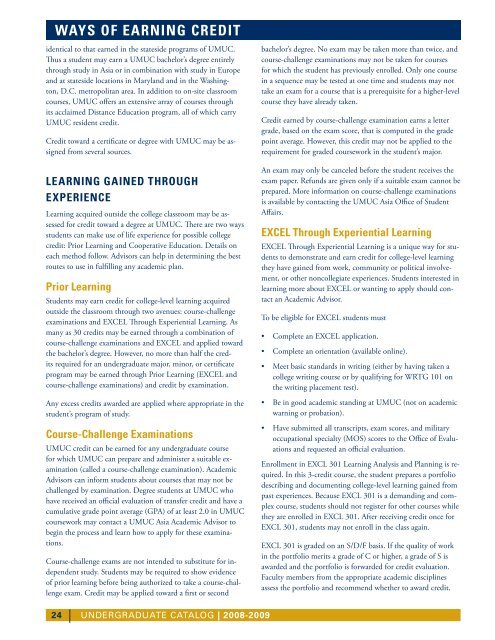welcome to UmUc - UMUC Asia - University of Maryland University ...
welcome to UmUc - UMUC Asia - University of Maryland University ...
welcome to UmUc - UMUC Asia - University of Maryland University ...
Create successful ePaper yourself
Turn your PDF publications into a flip-book with our unique Google optimized e-Paper software.
Ways <strong>of</strong> earning Credit<br />
identical <strong>to</strong> that earned in the stateside programs <strong>of</strong> <strong>UMUC</strong>.<br />
Thus a student may earn a <strong>UMUC</strong> bachelor’s degree entirely<br />
through study in <strong>Asia</strong> or in combination with study in Europe<br />
and at stateside locations in <strong>Maryland</strong> and in the Washing<strong>to</strong>n,<br />
D.C. metropolitan area. In addition <strong>to</strong> on-site classroom<br />
courses, <strong>UMUC</strong> <strong>of</strong>fers an extensive array <strong>of</strong> courses through<br />
its acclaimed Distance Education program, all <strong>of</strong> which carry<br />
<strong>UMUC</strong> resident credit.<br />
Credit <strong>to</strong>ward a certificate or degree with <strong>UMUC</strong> may be assigned<br />
from several sources.<br />
Learning Gained Through<br />
Experience<br />
Learning acquired outside the college classroom may be assessed<br />
for credit <strong>to</strong>ward a degree at <strong>UMUC</strong>. There are two ways<br />
students can make use <strong>of</strong> life experience for possible college<br />
credit: Prior Learning and Cooperative Education. Details on<br />
each method follow. Advisors can help in determining the best<br />
routes <strong>to</strong> use in fulfilling any academic plan.<br />
Prior Learning<br />
Students may earn credit for college-level learning acquired<br />
outside the classroom through two avenues: course-challenge<br />
examinations and EXCEL Through Experiential Learning. As<br />
many as 30 credits may be earned through a combination <strong>of</strong><br />
course-challenge examinations and EXCEL and applied <strong>to</strong>ward<br />
the bachelor’s degree. However, no more than half the credits<br />
required for an undergraduate major, minor, or certificate<br />
program may be earned through Prior Learning (EXCEL and<br />
course-challenge examinations) and credit by examination.<br />
Any excess credits awarded are applied where appropriate in the<br />
student’s program <strong>of</strong> study.<br />
Course-Challenge Examinations<br />
<strong>UMUC</strong> credit can be earned for any undergraduate course<br />
for which <strong>UMUC</strong> can prepare and administer a suitable examination<br />
(called a course-challenge examination). Academic<br />
Advisors can inform students about courses that may not be<br />
challenged by examination. Degree students at <strong>UMUC</strong> who<br />
have received an <strong>of</strong>ficial evaluation <strong>of</strong> transfer credit and have a<br />
cumulative grade point average (GPA) <strong>of</strong> at least 2.0 in <strong>UMUC</strong><br />
coursework may contact a <strong>UMUC</strong> <strong>Asia</strong> Academic Advisor <strong>to</strong><br />
begin the process and learn how <strong>to</strong> apply for these examinations.<br />
Course-challenge exams are not intended <strong>to</strong> substitute for independent<br />
study. Students may be required <strong>to</strong> show evidence<br />
<strong>of</strong> prior learning before being authorized <strong>to</strong> take a course-challenge<br />
exam. Credit may be applied <strong>to</strong>ward a first or second<br />
bachelor’s degree. No exam may be taken more than twice, and<br />
course-challenge examinations may not be taken for courses<br />
for which the student has previously enrolled. Only one course<br />
in a sequence may be tested at one time and students may not<br />
take an exam for a course that is a prerequisite for a higher-level<br />
course they have already taken.<br />
Credit earned by course-challenge examination earns a letter<br />
grade, based on the exam score, that is computed in the grade<br />
point average. However, this credit may not be applied <strong>to</strong> the<br />
requirement for graded coursework in the student’s major.<br />
An exam may only be canceled before the student receives the<br />
exam paper. Refunds are given only if a suitable exam cannot be<br />
prepared. More information on course-challenge examinations<br />
is available by contacting the <strong>UMUC</strong> <strong>Asia</strong> Office <strong>of</strong> Student<br />
Affairs.<br />
EXCEL Through Experiential Learning<br />
EXCEL Through Experiential Learning is a unique way for students<br />
<strong>to</strong> demonstrate and earn credit for college-level learning<br />
they have gained from work, community or political involvement,<br />
or other noncollegiate experiences. Students interested in<br />
learning more about EXCEL or wanting <strong>to</strong> apply should contact<br />
an Academic Advisor.<br />
To be eligible for EXCEL students must<br />
• Complete an EXCEL application.<br />
• Complete an orientation (available online).<br />
• Meet basic standards in writing (either by having taken a<br />
college writing course or by qualifying for WRTG 101 on<br />
the writing placement test).<br />
• Be in good academic standing at <strong>UMUC</strong> (not on academic<br />
warning or probation).<br />
• Have submitted all transcripts, exam scores, and military<br />
occupational specialty (MOS) scores <strong>to</strong> the Office <strong>of</strong> Evaluations<br />
and requested an <strong>of</strong>ficial evaluation.<br />
Enrollment in EXCL 301 Learning Analysis and Planning is required.<br />
In this 3-credit course, the student prepares a portfolio<br />
describing and documenting college-level learning gained from<br />
past experiences. Because EXCL 301 is a demanding and complex<br />
course, students should not register for other courses while<br />
they are enrolled in EXCL 301. After receiving credit once for<br />
EXCL 301, students may not enroll in the class again.<br />
EXCL 301 is graded on an S/D/F basis. If the quality <strong>of</strong> work<br />
in the portfolio merits a grade <strong>of</strong> C or higher, a grade <strong>of</strong> S is<br />
awarded and the portfolio is forwarded for credit evaluation.<br />
Faculty members from the appropriate academic disciplines<br />
assess the portfolio and recommend whether <strong>to</strong> award credit.<br />
24<br />
UNDERGRADUATE CATALOG | 2008-2009

















